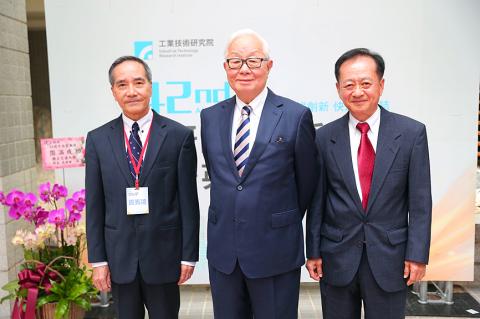Former Taiwan Semiconductor Manufacturing Co (TSMC, 台積電) joint chief operating officer Chiang Shang-yi (蔣尚義) is to take a job at Chinese rival Semiconductor Manufacturing International Corp (SMIC, 中芯國際), the Shanghai-based chipmaker said yesterday.
SMIC’s announcement ruffled feathers in local semiconductor circles, as Chiang is one of the key people who helped TSMC clinch top spot in the global semiconductor market through a slew of technological upgrades.
Chiang retired as vice president of TSMC’s research and development division in 2006, but he was “summoned” to rejoin the company in 2009 by TSMC chairman Morris Chang (張忠謀) to assist with the upgrades to 28-nanometer, 20-nanometer and 16-nanometer technologies.

Photo: Hung Yu-fang, Taipei Times
The advanced chips accounted for 55 percent of the chipmaker’s total revenue last quarter.
In 2013, Chiang, 70, retired again and was tapped as an adviser to Chang for the following two years. That role ended in December last year.
TSMC said that it was informed by Chiang in advance about his new position and that it does not expect it to adversely impact the company.
His position would be part of SMIC’s efforts to enhance its corporate governance and it is not linked to the chipmaker’s operations, TSMC said.
SMIC, the biggest contract chipmaker in China, has been struggling to implement advanced technologies and it lags behind TSMC by about three generations in terms of technology.
TSMC is planning to ship 10-nanometer chips in the first quarter next year, while SMIC is still relying on 28-nanometer chips.
SMIC’s revenue contribution from its 28-nanometer chips increased to 1.4 percent of its overall revenue last quarter, up from 0.1 percent the previous year, according to the company’s financial statement.
TSMC has a more than 70 percent share of the worldwide 28-nanometer chip market.
Chiang would be an independent non-executive director, the company said in a filing with Hong Kong Exchanges and Clearing Ltd.
Chiang does not hold any other position at SMIC or any of its subsidiaries, SMIC said in the filing.
Chiang led TSMC’s research and development as it set milestones in semiconductor technology, from legacy 0.25-micron chips to advanced 16-nanometer FinFET technologies, transforming TSMC from a technology follower to a technology leader, SMIC said.
Chiang is to receive annual cash compensation of US$40,000 and an option to subscribe for 187,500 SMIC ordinary shares, the company said.
TSMC shares fell 1.37 percent to close at NT$180 in Taipei trading yesterday, while SMIC shares slipped 0.76 percent in Hong Kong trading.

US President Donald Trump yesterday announced sweeping "reciprocal tariffs" on US trading partners, including a 32 percent tax on goods from Taiwan that is set to take effect on Wednesday. At a Rose Garden event, Trump declared a 10 percent baseline tax on imports from all countries, with the White House saying it would take effect on Saturday. Countries with larger trade surpluses with the US would face higher duties beginning on Wednesday, including Taiwan (32 percent), China (34 percent), Japan (24 percent), South Korea (25 percent), Vietnam (46 percent) and Thailand (36 percent). Canada and Mexico, the two largest US trading

AIR SUPPORT: The Ministry of National Defense thanked the US for the delivery, adding that it was an indicator of the White House’s commitment to the Taiwan Relations Act Deputy Minister of National Defense Po Horng-huei (柏鴻輝) and Representative to the US Alexander Yui on Friday attended a delivery ceremony for the first of Taiwan’s long-awaited 66 F-16C/D Block 70 jets at a Lockheed Martin Corp factory in Greenville, South Carolina. “We are so proud to be the global home of the F-16 and to support Taiwan’s air defense capabilities,” US Representative William Timmons wrote on X, alongside a photograph of Taiwanese and US officials at the event. The F-16C/D Block 70 jets Taiwan ordered have the same capabilities as aircraft that had been upgraded to F-16Vs. The batch of Lockheed Martin

GRIDLOCK: The National Fire Agency’s Special Search and Rescue team is on standby to travel to the countries to help out with the rescue effort A powerful earthquake rocked Myanmar and neighboring Thailand yesterday, killing at least three people in Bangkok and burying dozens when a high-rise building under construction collapsed. Footage shared on social media from Myanmar’s second-largest city showed widespread destruction, raising fears that many were trapped under the rubble or killed. The magnitude 7.7 earthquake, with an epicenter near Mandalay in Myanmar, struck at midday and was followed by a strong magnitude 6.4 aftershock. The extent of death, injury and destruction — especially in Myanmar, which is embroiled in a civil war and where information is tightly controlled at the best of times —

China's military today said it began joint army, navy and rocket force exercises around Taiwan to "serve as a stern warning and powerful deterrent against Taiwanese independence," calling President William Lai (賴清德) a "parasite." The exercises come after Lai called Beijing a "foreign hostile force" last month. More than 10 Chinese military ships approached close to Taiwan's 24 nautical mile (44.4km) contiguous zone this morning and Taiwan sent its own warships to respond, two senior Taiwanese officials said. Taiwan has not yet detected any live fire by the Chinese military so far, one of the officials said. The drills took place after US Secretary